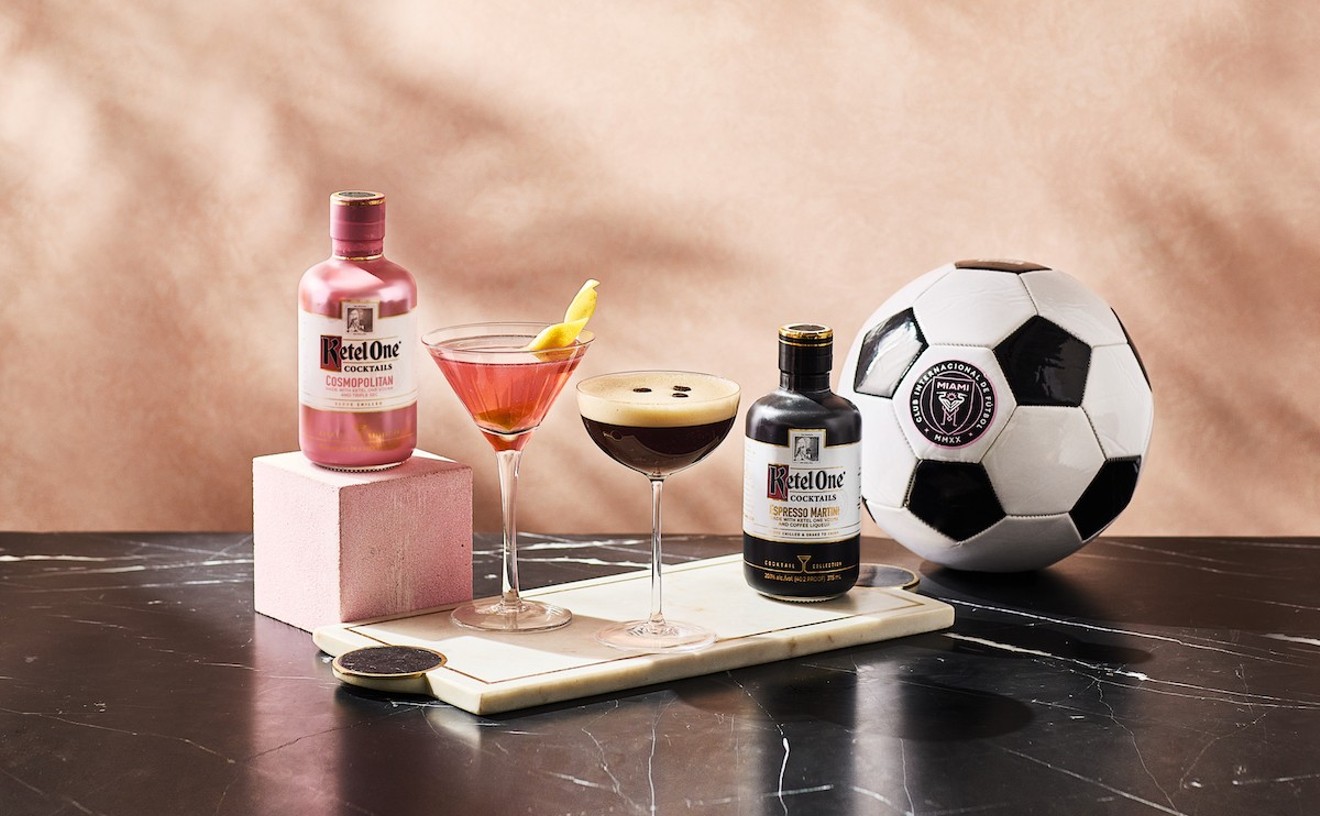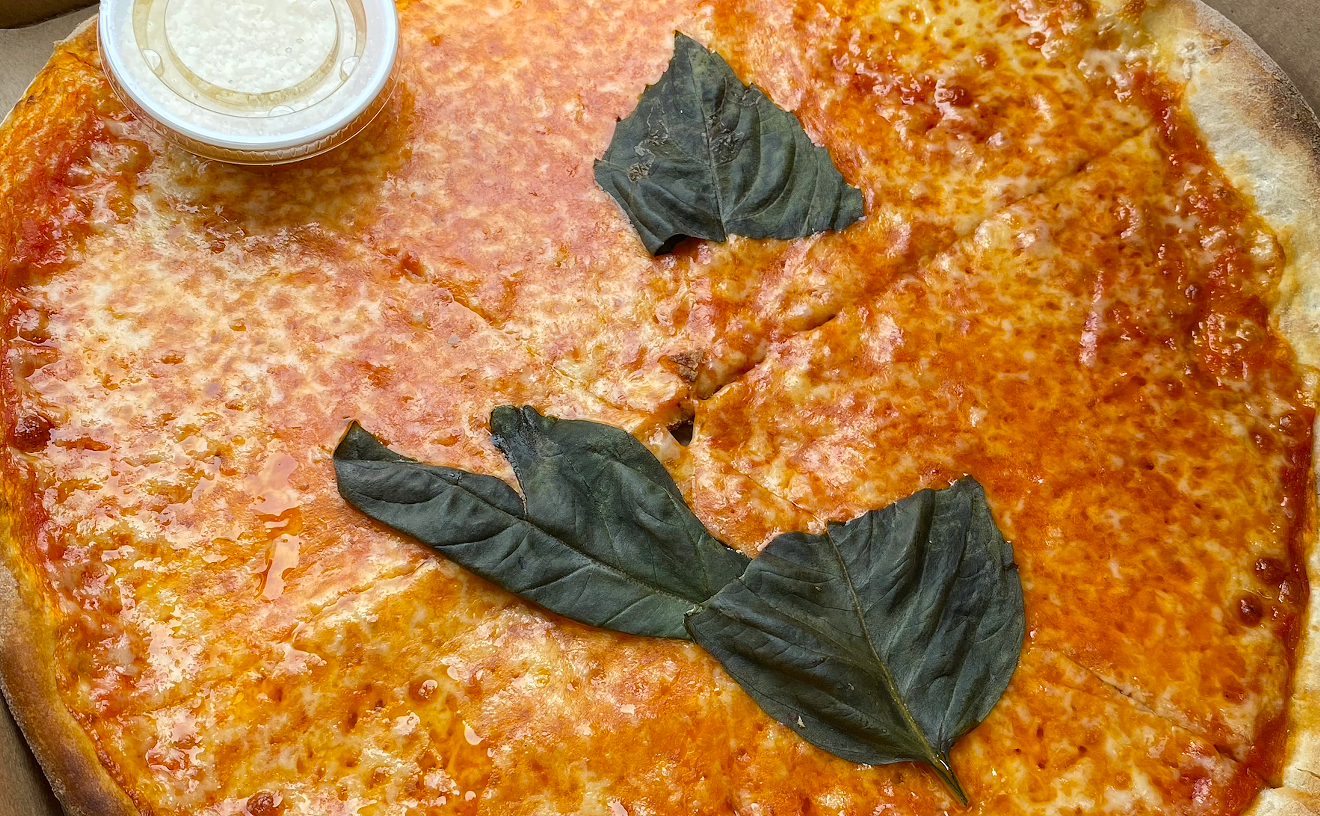Chef Andy Trousdale, an expat form northern England has been in the South Florida culinary scene for a number of years. A former yacht chef and culinary instructor at the Art Institute, he's had ample experience with teaching culinary enthusiasts about a wide range of strange and exotic foods.
As part of this week's review, of Trousdale's Funky Food Club at his restaurant Le Bistro,we decided to chat with the chef to learn more about his background, food he's seen around the world, and his experience with Gordon Ramsay.
See Also:
Clean Plate Charlie: Andy, how do you feel growing up in England has affected your culinary style?
Trousdale: Shop fresh, cook fresh, serve fresh. Buy and use only what you need. What comes to mind is the saying "you don't know what you've got till it's gone." Growing up in England has enlightened and spoiled me. In England, as in all of Europe, the food supply is mostly regional. You have the richest dairy, high quality cattle and fowl, beautiful fresh fish and unbelievable produce. The richness of the soil is the basis to everything that grows from it and feeds from it. That is ideal in the world of the chef, being close to the highest quality source.
Here everything comes from everywhere. It's great to have access to so much, but my preference is to know the farmer, the breeder, and the fisherman. In England the weather is seasonal, with seasonal food items dictating menus. Some narrow-minded people still think that England has boring, bland food. In some cases yes. It's like that everywhere.
There was still food rationing coupons in England up until 1950. Now, there are over 80 Michelin starred restaurants including the only one outside of France that kept its 3 Michelin stars for over 25 years. That restaurant started by Michel Roux in 1972 is called the Waterside Inn, located in a little village in Bray, London. I was 22 years old when I worked there and climbed through the ranks to becoming Chef de partie, Saucier. That's one of the most important jobs in the kitchen - sauces and sautéing, third in line from the chef. No one else in our area can make that claim. This was one of the great starts to my career as Michel Roux revolutionized British Haut Cuisine along with his brother Albert. We still keep in touch. I assisted Michel when he hosted the Davidoff Gourmet Night at Casa Casuarina on Ocean Drive. I heard from him recently when he sent me a message through Gordon Ramsay.
We've been told you have lived and cooked all over the world. Can you tell us more about your experiences?
I have had some amazing experiences. In Germany, struggling to understand what anyone was talking about: as a private chef in the South of France on an estate with acres of lavender in the driveway. There, a chauffeur would escort me to the local markets. I worked at Relais et Chateau properties where they had their own gardens and stables. Anything I needed was there for the picking. When I worked in the Virgin Islands, it was easy to get the best fish, but anything else was a struggle and imported. You had to hope you'd get what you asked for and when you needed it. Everything is very expensive as reflected in the restaurant menu prices.
Early on, the three star Michelin Restaurants experiences, which probably compares to life as a soldier. I can tell you first hand it is no walk in the park. It is rigid, difficult, humiliating and humbling. Especially working in another country when you don't speak the language. That's where you gain respect. You work your ass off triple time to learn and prove yourself so you can climb the rungs on the ladder. Michel Roux once told me I was the best saucier to ever work in his kitchen. Although asked to stay, I opted to leave when I learned as much as I could, because I was determined to one day own my own restaurant. I wanted to travel around, gaining different experiences.
Where have you spent time? And how have those places affected your career?
I have worked and spent time in France, Belgium, Holland, Germany, Jersey, the Channel Islands, all over England, the Caribbean, and US-Florida. It's very different here in the US compared to most other places I've been. Here on the mainland USA it's like a walk in the park, for the most part. The industry is not held to the same esteem as in Europe.
As an example, overseas waiters are trained for a life career. That just does not exist here. I may be one of the only chef's in South Florida that is British, European trained who worked for extensive lengths of time in several Michelin starred and Relais Chateaux Properties, who took on Gordon Ramsay, and has owned and operated a restaurant with my wife for 12 years without anyone else's money. That has to do with our knowledge and respect for what we do. Wherever you are you have to grab your balls, pull up your britches, and get on with it. I had to trust in my experiences and what I knew while adapting to foreign surroundings. It's the confidence that you know what you are doing that speaks volumes for everyone to see.
We heard you cooked on yachts. Do you have any ridiculous yacht stories?
Flying into the Amazon to take on a Head chef position on a 200-foot motor yacht was the start of it. Upon arrival first day, couple of the crew and I went out to the town for a beer, to get to know one another. One of the guys was approached by a young destitute hooker, who he turned down. Next thing you know, the pimp comes out of nowhere and cuts his eye, resulting to us fleeing and then to a makeshift medical facility and 30 stitches. Another time we traded goods with real live Pygmies in the Amazon jungle. We gave them t-shirts and soda and they gave us unknown exotic fruits and vegetables. We had all good intention, however we had to throw it all overboard because of horrible weird insects.
Which port was your favorite?
As far as my favorite port, Fort Lauderdale must have been because I never left! I'll tell you something I have never mentioned in an interview before. In 1992, that yacht brought me to the United States for the very first time. It was 3 months after Hurricane Andrew. I had four things with me that mattered: my suitcase, a wad of saved cash, my experience and my credentials.
My immediate plan was to buy a one way ticket back to England; however a series of chance meetings and events led me to stay, along with the fact that I fell in love with the weather. The restaurant business was healthy enough. Jobs came easily. I became the head chef at the Plum Room, which was an upscale restaurant at the former Yesterday's on Oakland Park Blvd; the head chef at Stephanie's Market on Oakland, which closed a few years ago, they did a lot of catering; I worked as a waiter at Café de Paris and the Ambry when I first arrived; I worked on the line at the Blue Moon Fish Company.
I'll tell you what, in reality, these are the experiences that make one qualified to own and run a business from the inside out. I learned a lot about Florida--and how crazy it was back then. That's another story. No job was ever too big or small for me. It's the same way now. Here's another ridiculous story, In 1999, while running a busy restaurant in the Caribbean, I was asked to take over the kitchen at the very successful Left Bank off of Las Olas. They wanted me to pretend I was a former chef there so the customers wouldn't know he left. The guy who asked me to do this was also named Andy. I remember telling him where to go.
Can you tell us about your experience at the Art Institute? What was it like to teach in that environment?
I mostly enjoyed the 7 years I spent there teaching a multitude of culinary classes. When the students were serious about learning, that is. The rest who were not really into it, annoyed me because they were wasting their own time, fellow students' time, my time, and a lot of money. I remain in close contact with many of my former students who have gone on to become caterers, restaurant owners, some who work for me and others who have become instructors themselves.
How has Kitchen Nightmares affected your business? Is Gordon Ramsey actually an ass hole in real life?
We are very glad we participated in the show. The fact that we are a thriving landmark South Florida restaurant helps. Elin and I have proven to be successful restaurateurs. It's great to have a little PR assistance from our friend Gordon to push things along. Either spend thousands on a good publicist or do what we did, have Gordon come in, put up with his shit for a week and Voila! Two major network shows, International TV--repeated often--paid for by a little mocking. So what?
This was an excellent business decision. I don't think Gordon is an asshole. If he is, he is a very, very successful asshole. Gordon and I had the same start, schlepping it in some very high-end perfectionist kitchens with hard-ass, ruthless, tyrant chefs. Only the strong survive. Being verbally and mentally beaten up in a kitchen over time can make anyone an asshole. Me, I sometimes wonder what would have become of my career if I stayed in England. However, we have done everything on our own and I am very proud of that. We don't owe anyone anything! We sleep easy at night.
You have mentioned your frustration with the South Florida culinary scene. Which improvements would you like to see?
There should be more to offer than mango salsa, plantains, rice and beans and chopped parsley on the rim of the plate. We have chefs with great culinary talent that need to be recognized, and not just in Miami. Maybe then the Michelin Guide will take an interest in South Florida.
In what ways does the average palate here differ from that found in other cities and countries?
Based on the availability of so much pre-made, prepackaged food items available in supermarkets and majority of restaurants here--just go to Restaurant Depot, Sysco, Chaney Brothers and take a look at what can be purchased already prepared. Read the labels; note the sodium, sugars, and calories in addition to other questionable ingredients. I sometimes think the majority of people here even don't even know what real food is and tastes like. It is truly unnerving. The U.S. concentrates on sweet items, maybe that's why America is the largest consumer of sugar in the world. breads, soda, sauces, even French fries. America is not the only one guilty of this. I find Asian cooking guilty the same way. Lots of salty and sweet prepared sauces used.
Which culinary professionals do you most respect?
The trained working chef, like me. Works his ass off: respects the food and the costs.
Which are your three favorite ingredients?
Great salt, chilies, fresh seafood.
Favorite beer?
In America - yeunling, black & tan. In England - Boddingtons - on tap of course.
Do you have a favorite dish from the food club?
Too many to mention.
A least favorite?
Baby anchovies and chilli beer shot.
Read the Full Review of the Funky Food Club.
Follow @ CleanPlateBPB










